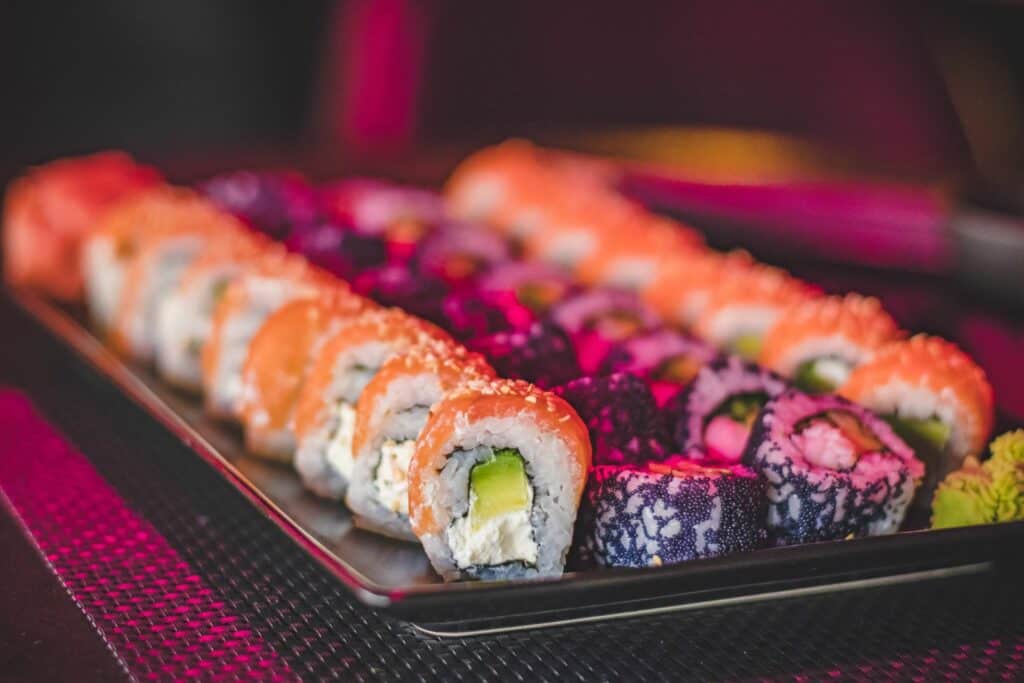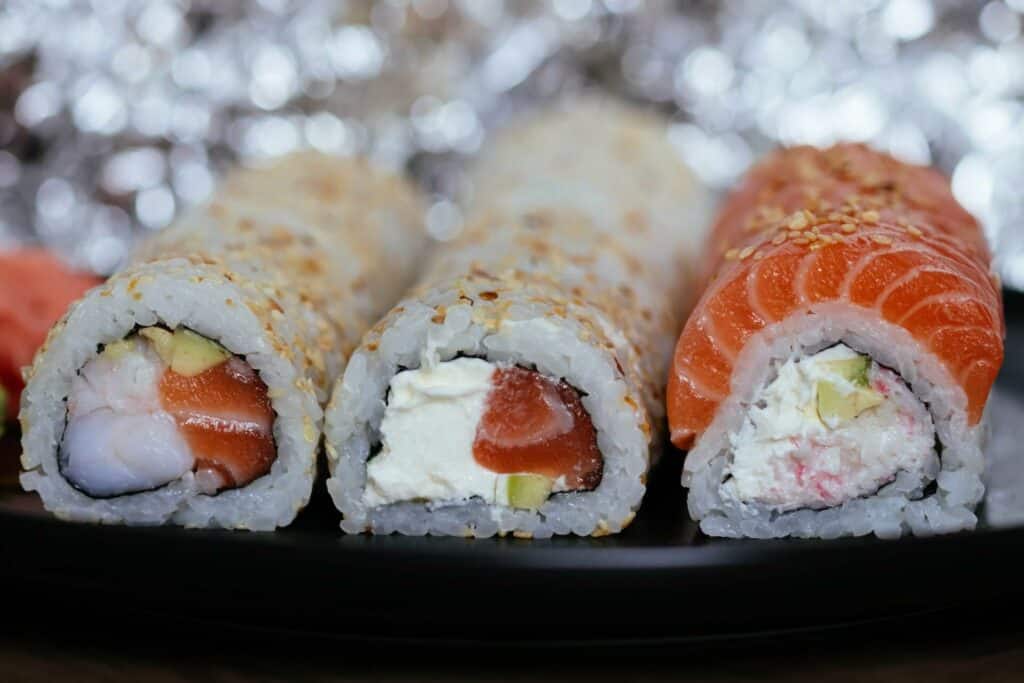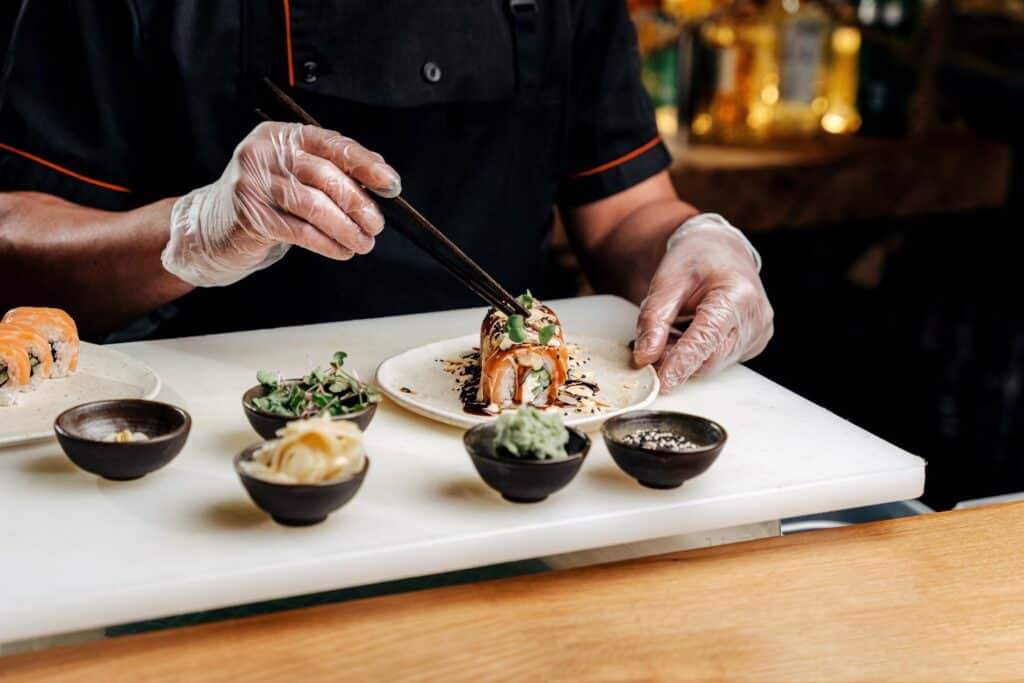Sushi is a delicious dish that is often enjoyed by vegans and meat-eaters alike. But does sushi have dairy?
Most sushi does not contain dairy, as the traditional Japanese dish is typically made with fish, rice and vegetables. However, some types of sushi may include cream cheese or other dairy-based ingredients, so it’s always best to check with your sushi chef before ordering.
For those looking for a strictly dairy-free meal, there are plenty of delicious vegan and vegetarian options available at most sushi restaurants.


If you’re curious to track down sushi that doesn’t have any dairy, this article may help you.
Does Sushi Have Dairy, and Which Kinds?
Sushi could have dairy, depending on the type of roll you order. American-crafted sushi such as Philadelphia and California rolls contains allergens that could cause severe allergic reactions.
On the other hand, authentic Japanese sushi didn’t initially contain any dairy, as it was made only from tuna, rice, and seaweed. You’ll have a better chance of getting dairy-free rolls and sushi if you order authentic sushi.
The best thing you can do while tracking down sushi that’s good for you is to read the labels on store-bought rolls or ask the restaurant staff to prepare them allergen-free.
Lactose Intolerant People, Beware of California and Philadelphia Rolls
Understandably, you love California rolls. What’s not to like? The freshness of the cucumber paired with the salty crab taste can only be experienced in this meal. The bad part comes when you encounter a roll containing imitation crab.
Surimi crab sticks aren’t actual crab, hence the ‘imitation’ in the name. They’re actually dyed white fish sticks with crab meat flavoring. The additives in crab sticks contain dairy, making them unsafe for lactose-intolerant people.
Philadelphia rolls were named after one of their main ingredients – the world-famous Philadelphia cream cheese (which, interestingly enough, was invented in New York.) Other than cream cheese, there’s smoked salmon and cucumber.
Overall, a fantastic sandwich combo but terrible for any dairy-sensitive folks. Watch out for these rolls in restaurants, and if you can’t resist a fine Cali roll, check with the staff if the crab they use is real or not.

Which Sushi Doesn’t Contain Dairy?
Authentic Japanese sushi wasn’t created with any dairy-containing ingredients. It was a simple, three to four-ingredient recipe – seaweed, rice, and raw fish or veggies.
A splash of rice vinegar is usually added to the cooked rice to give it a fuller taste and make it easier to shape. Some old recipes contain wasabi paste, too.
Maki rolls can have cream cheese in some restaurants, so ensure you read the contents in detail. Still, most of them don’t and are perfectly safe for consumption.
Rice and Fish Don’t Have Lactose but Be Careful Around Other Allergens
Check out the table below to see which typical sushi ingredients contain common allergens. If there are too many, maybe eating sushi isn’t right for you.
However, you can always go for a homemade sushi recipe and design a roll to your liking.
| Vegan | Dairy | Soy | Shellfish | Gluten | |
| Rice | Yes | No | No | No | No |
| Seaweed | Yes | No | No | No | No |
| Imitation crab | No | Yes | No | Yes | Yes |
| Real crab | No | No | No | Yes | No |
| Tuna | No | No | No | No | No |
| Salmon | No | No | No | No | No |
| Tofu | Yes | No | Yes | No | No |
| Cream cheese | No | Yes | No | No | No |
| Soy sauce | Yes | No | Yes | No | Yes |
| Tempura | Yes | No | No | No | Yes |
How to Know if the Sushi You Buy Has Dairy or Allergens?
It would be mean to say that you’ll notice if sushi you just ate contains ingredients you’re allergic to, but it’s true. Still, no one wants a firsthand experience with such dangers, so it’s essential to learn how to recognize which rolls contain safe and unsafe ingredients.
Pre-packaged Sushi Has Warnings on the Labels
When you buy pre-packaged sushi in supermarkets, there are usually labels on the boxes. These labels are your best friend – when you take your time shopping and read them carefully, you’ll safely avoid an allergic reaction.
According to research, the highest-quality pre-packaged sushi can be purchased in Whole Foods. Their sushi supplier is Genji Sushi, a popular chain with over 200 restaurants across the US and UK and 25 years of supply experience with Whole Foods.
Chefs and Waiters Will Help You Choose the Perfect Sushi Roll for Yourself
Restaurants typically list meal ingredients on their menus, so you can choose suitable sushi without experiencing difficulties and allergic reactions. If there’s no ingredient list, make sure to ask the staff.
If you sit at a restaurant where the chef prepares the sushi right in front of you, ask them to prepare something dairy-free. Don’t worry about causing trouble when asking for something so simple – they’ll make it safe to eat if you communicate it to them.

Read the Content Labels and Ask Waiters for Dairy Warnings to Avoid a Potential Disaster
So, there are kinds of sushi that are served with dairy and other allergens, but you can easily avoid them. Understandably, some varieties may sound a bit tastier than others.
Still, keeping your health in mind, it’s better to eat something delicious and safe than to risk your health for a couple of tasty moments.
Check with the chefs and the staff if you’re at a restaurant, and if you get store-bought sushi, read the packaging very carefully.